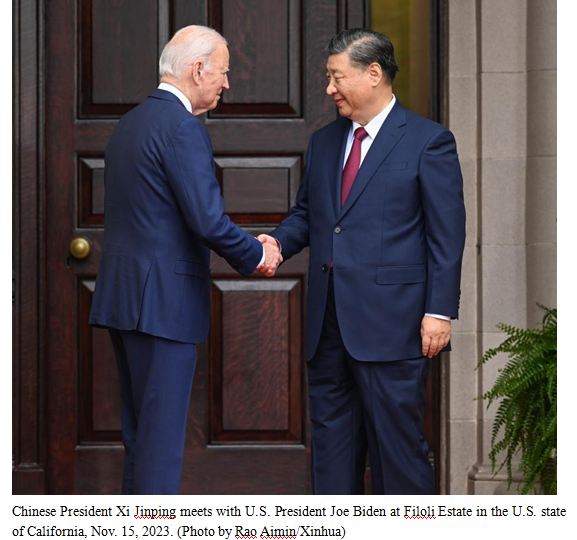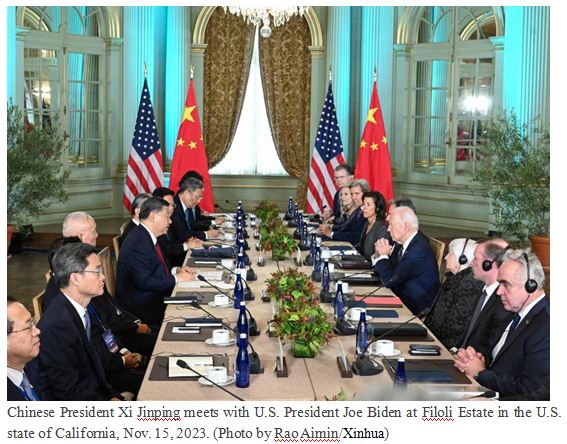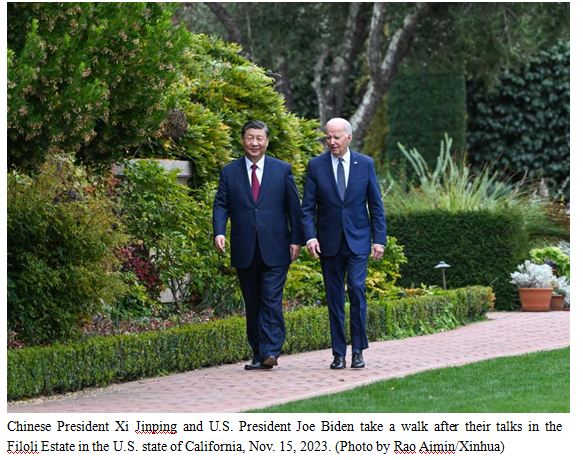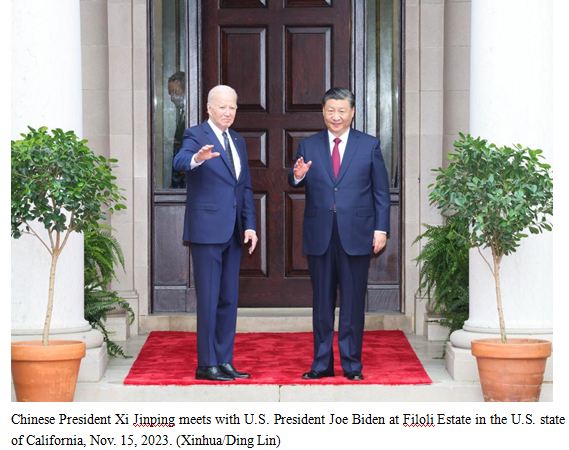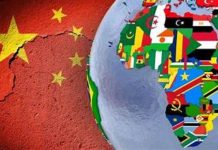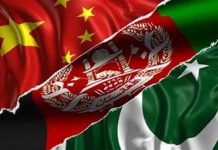By Zhong Sheng, People’s Daily
Chinese President Xi Jinping met with U.S. President Joe Biden at Filoli Estate, San Francisco on Nov. 15, local time. It was a strategically significant and far-reaching meeting of the two heads of state.
Xi and Biden had an exchange of views on strategic and overarching issues critical to the direction of China-U.S. relations and on major issues affecting world peace and development.
Xi gave a comprehensive and authoritative presentation on China’s position on stabilizing and improving China-U.S. relations, stressing the importance of making the right choice for history, finding the right way to get along and fostering a San Francisco vision for the relations.
The meeting is significant for enhancing trust, removing suspicion, managing differences and expanding cooperation between China and the United States. It is also significant for injecting certainty and stability into a world of turbulence and transformation.
China and the United States are the world’s top two economies. Are China and the United States partners or rivals? Should they engage in mutually beneficial cooperation or antagonism and confrontation? This is a fundamental question on which disastrous mistakes must be avoided.
If one sees the other side as a primary competitor, the most consequential geopolitical challenge and a pacing threat, it will only lead to misinformed policy making, misguided actions, and unwanted results.
For China and the United States, turning their back on each other is not an option, Xi noted, stressing it is unrealistic for one side to remodel the other, and conflict and confrontation has unbearable consequences for both sides.
Major-country competition cannot solve the problems facing China and the United States or the world, he continued, noting that the world is big enough to accommodate both countries, and one country’s success is an opportunity for the other.
China hopes that the two countries could be partners, perceiving and envisioning China-U.S. relations from the perspective of the future of humanity and Planet Earth. This fully demonstrated China’s major country responsibility for history, people and the world.
The fundamental principles that China follows in handling China-U.S. relations are mutual respect, peaceful coexistence and win-win cooperation, which are the lessons learned from 50 years of China-U.S. relations and the conflicts between major countries in history. They should be the direction of joint efforts between the two countries.
Just as mutual respect is a basic code of behavior for individuals, it is fundamental for China-U.S. relations. The two countries’ paths are different, but both are the choice by their peoples, and both lead to the realization of the common values of humanity. They should be both respected.
Peaceful coexistence is a basic norm for international relations, and is even more of a baseline that China and the United States should hold on to as two major countries.
China never bets against the United States, and never interferes in its internal affairs. China has no intention to challenge the United States or to unseat it. Instead, it will be glad to see a confident, open, ever-growing and prosperous United States.
Likewise, the United States should not bet against China, or interfere in China’s internal affairs. It should instead welcome a peaceful, stable and prosperous China.
Win-win cooperation is the trend of the times, and it is also an inherent property of China-U.S. relations.
China is pursuing high-quality development, and the United States is revitalizing its economy. There is plenty of room for their cooperation, and they are fully able to help each other succeed and achieve win-win outcomes. They should make the cooperation list longer and the pie of cooperation bigger.
Recently, the two countries have been actively implementing the consensus reached by the two heads of state in Bali, Indonesia, creating conditions for fostering a San Francisco vision for the relations.
During his meeting with Biden this time in San Francisco, Xi said that China and the United States should jointly develop a right perception, jointly manage disagreements effectively, jointly advance mutually beneficial cooperation, jointly shoulder responsibilities as major countries, and jointly promote people-to-people exchanges.
Through joint efforts in these five areas, five pillars can be put in place for China-U.S. relations to grow steadily and a new vision is fostered for China-U.S. relations going into the future.
The summit meeting reached more than 20 deliverables in such areas as political affairs and foreign policy, people-to-people exchange, global governance, and military and security.
On principles guiding the China-U.S. relations, the two presidents endorsed the efforts of their respective diplomatic teams to discuss principles related to China-U.S. relations since the Bali meeting and the common understandings arising from those discussions.
They stressed the importance of all countries treating each other with respect and finding a way to live alongside each other peacefully, and of maintaining open lines of communication, preventing conflict, upholding the United Nations Charter, cooperating in areas of shared interest, and responsibly managing competitive aspects of the relationship.
These seven points of common understanding are very important in that they provide a solid foundation for deeper discussions going forward. They are further proof of the broad common interests of China and the United States and the mutually beneficial nature of China-U.S. relations. They demonstrate that dialogue and cooperation is the only right choice for the two countries.
China and the United States are different in history, culture and social system, and how to deal with these differences is an important issue that both sides always need to address.
China is committed to having a stable, healthy and sustainable relationship with the United States. At the same time, China has legitimate interests that must be safeguarded, principles and positions that must be upheld, and red lines that must not be crossed.
If the U.S. side is bent on encircling and containing China under the pretext of competition, China will firmly uphold its sovereignty, security and development interests.
The Taiwan question remains the most important and most sensitive issue in China-U.S. relations. China urges the United States to honor the one-China principle, oppose “Taiwan independence,” stop arming Taiwan, stop interfering in China’s internal affairs, and support China’s peaceful reunification. China will realize reunification, and this is unstoppable.
U.S. attempts to curb or suppress China on economy, trade and technology are creating risks instead of “de-risking.” These misguided actions, and the ensuing uncertainty for China-U.S. relations, have become the biggest risk.
Stifling China’s technological progress is nothing but a move to curb China’s high-quality development and deprive the Chinese people of their right to development. China will not accept that and such a move will not succeed.
China’s development and growing strength, powered by strong internal drivers and its own inherent logic, will not be stopped by external forces. It is important that the U.S. side take China’s concerns seriously, lift unilateral sanctions, and provide an equal, fair, and nondiscriminatory environment for Chinese businesses.
A stabilizing and improving China-U.S. relationship is in the fundamental interests of the two countries and the common aspiration of the international community. Under the stewardship of the two presidents, the giant ship of China-U.S. relations has navigated hidden rocks and dangerous shoals.
The journey from Bali to San Francisco has not been an easy one. However, San Francisco should not be the finish line; it should be a new starting point. From San Francisco onward, the two sides should foster a new vision, further consolidate the foundation of their relations, build pillars for peaceful coexistence, and move their relationship in the direction of healthy, stable and sustainable development.
(Zhong Sheng is a pen name often used by People’s Daily to express its views on foreign policy and international affairs.)
